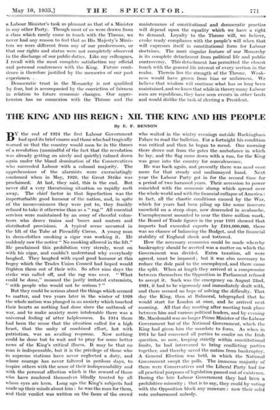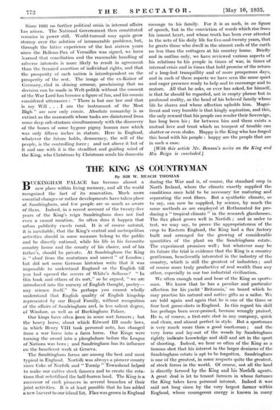THE KING AND HIS REIGN: XII. THE KING AND HLS
PEOPLE
By E. F. BENSON BYthe end of 1924 the first Labour Government : had sped its brief course and those who hail tragically warned us that the country would soon be in the throes of a revolution- (unmindful Of the fact that the revolution was already getting on nicely and quietly) ealmed down again under the bland domination of the Conservatives who succeeded Labour with a colossal majority. The apprehensions of the alarniists were excruCiatingly confirmed -When in May, 1926, the Great Strike was proclaimed.' At last, they said, this is the end. But never did a very threatening situation so rapidly melt away. The chief factor in that liquefaction was the imperturbable good humour of the nation, and, in spite of the inconveniences 'they were put to; 'they frankly refused to take it otherwise than as a" rag." All essential services were maintained by an army of cheerful volun- teers who drove trains and 'buses and motors and distributed provisions: • A typical scene occurred in the lift of the Tube at Piccadilly Circus. A young man in dress-clothes smoking a cigar was working it. He suddenly saw the notice" No smoking allowed in the lift." Ile proclaimed this prohibition very 'sternly, went oti with his 'cigar, and couldn't understand why everybody laughed. They laughed With equal good humour at this bogey which the Trades Union Council had hoped would frighten them out of their wits. So after nine days the strike Wa called off, and the rag was over. "What could be done," moaned the justly irritated extremists, "with people who would not be serious ? "
But they could be serious about the things which seemed to matter, and two years later in the winter of 1928 the whole nation was plunged in an anxiety which touched their hearts as nothing -had done since the outbreak of war, and to make anxiety more intolerable there was a universal feeling of utter helplessness. In 1914 there had been the sense that the situation called for a high heart, that 'the unity of combined effort, hot with patriotism, was an availing response. Now nothing could be done but to wait and to pray for some better news of the King's Critical illness. It may be that no man is indispensable, but it is the privilege of those who in supreme stations have never neglected a duty, and whose courage has never faltered in perilous days, to inspire others with the sense of their indispensability and with the' personal affection which is the reward of those who have rendered themselves blindly trusted by all whose eyes are keen. Long ago the King's subjects had made up their minds about him : he was the man for them, and their verdict was written on the faces of the crowd who waited in the wintry evenings outside Buckingham Palace to read the bulletins. For a fortnight his condition was' criticaland then he began to mend. One morning there drove out from the gates the ambulance in which he lay, and the flag came down with a run, for the King was gone into the country for convalescence.
He was back again, and presently there was need once more for that steady and undismayed hand. Next year the Labour Party got in for the second time for a period of two harassed years. Their accession to power coincided with the economic slump which spread over the whole world and with the financial collapse of America : in fact, all the chaotic conditions caused by the War, which for years had been piling up like some insecure snowfield on a steep slope, now descended in avalanche. Unemployment mounted to near the three million mark, the Board of Trade figures in the year 1931 showed that imports had exceeded exports by £104,000,000, there was no chance of balancing the Budget, and the financial stability of England shook and tottered.
How the necessary economies could be made whereby bankruptcy should be averted was a matter on which the Government was divided. Extra taxation, all were agreed, must be imposed ; but it was also necessary to reduce the dole paid to the unemployed, and there came the split. When at length they arrived at a compromise between themselves the Opposition in Parliament refused to accept it. Such was the emergency on August 22nd, 1931, it had to be vigorously and immediately dealt with, and there seemed no hope of solving the difficulty. That day the King, then at Balmoral, telegraphed that he would start for London at once, and he arrived next morning. All that day meeting after meeting took place between him and various political leaders, and by evening Mr. Macdonald was no longer Prime Minister of the Labour Government but of the National Government, which the King had given him the mandate to form. As when in 1914 he had convened all parties to confer on the Irish question, so now, keeping strictly within constitutional limits, he had intervened to bring conflicting parties together, and thereby saved the nation from bankruptcy. A General Election was held, in which the National Government swept the polls. The immense majority of them were Conservatives and the Liberal Party had for all practical purposes of legislation passed out of existence. During the late Labour Government they had been a prohibitive minority ; that is to say, they could by voting with the Opposition block any measure : now their solid vote embarrassed nobody. - Since 1931 no further political crisis in internal affairs has arisen. The National Government then constituted remains in power still. World-turmoil may. again grow stormy over the solution of innumerable problems, but, through the bitter experience of the last sixteen years • since the Bellona-Pax of Versailles was signed, we. have -learned that conciliation and the reasonable handling of adverse interests is more likely to result in agreement Than the frenzied assertion of individual rights, and that the prosperity of each nation is interdependent on the prosperity of the rest: The image of the ex-Kaiser of Germany, clad in shining armour, • proclaiming that no decision -can be made in Welt-politik without the consent of. the War Lord has become a figure of fun, and his cosmic considered utterances : "There is but one law and that is my Will . . . I am the instrument of the Most High" are now only comic. Absolute monarchy is as extinct as the mammoth whose tusks are disinterred from some deep sub-stratum simultaneously with the discovery of the bones of some bygone pigmy human race which was only fifteen inches in stature. Here in England, whatever the future holds, democracy, the will of the people, is the controlling force ; and not above it but of it and one with it is the steadfast and guiding mind of the King, who Christmas by Christmas sends his domestic message to .his family. For it is as such, in no figure of speech, but in the conviction of words which rise from his inmost heart, and whose.truth has been ever attested in the acts of his daily life for five-and-twenty years, that he greets those who dwell in the utmost ends of the earth no less than the cottagers at his country home. Briefly and in outline only, we have reviewed various aspects of his relations to his people in times of war, in times of internal crisis and in-times that hold promise of the return of a long-lost tranquillity and of more prosperous days, and in each of these aspects we have seen the same quiet and eager presence ready to help and to encourage and to restore. All that he asks, or ever has asked, for himself, is that he should be regarded, not in empty phrase but in profound reality, as the head of his beloved family whose life he shares and whose affection upholds him. Magni- ficent and very humble is that kingly aspiration, and this, the only reward that his people can render their Sovereign, has long been his ; for between him and them exists a mutual -love and trust which no tempest of trouble can shatter or even shake. Happy is the King who has forged this bond with his people : happy are the people that are in such a case.
[With this article Mr. Benson's series on the King and His Reign is concluded.]



































































 Previous page
Previous page